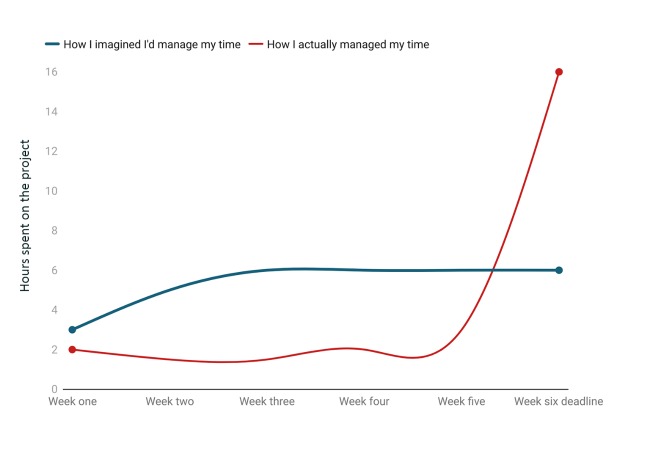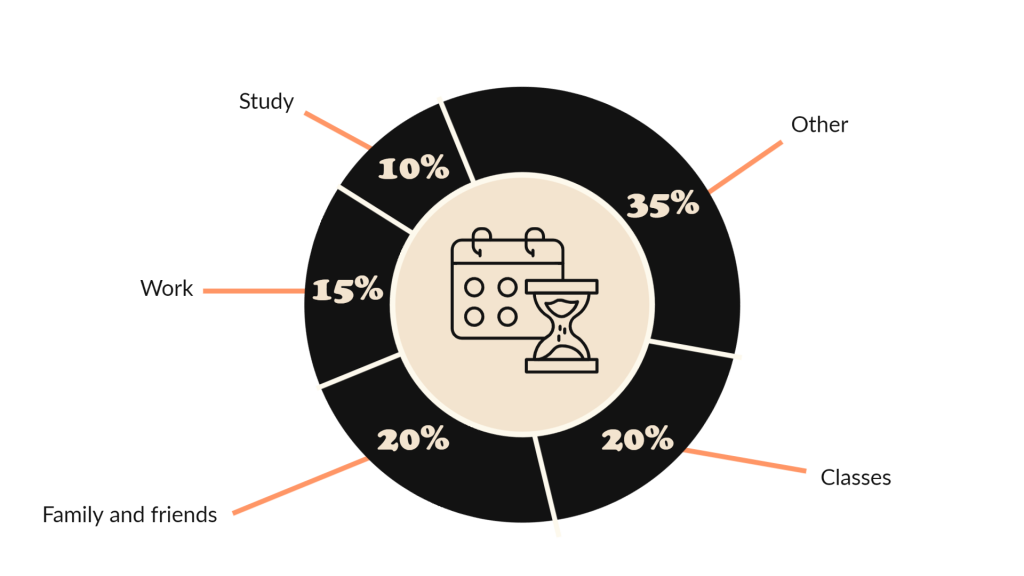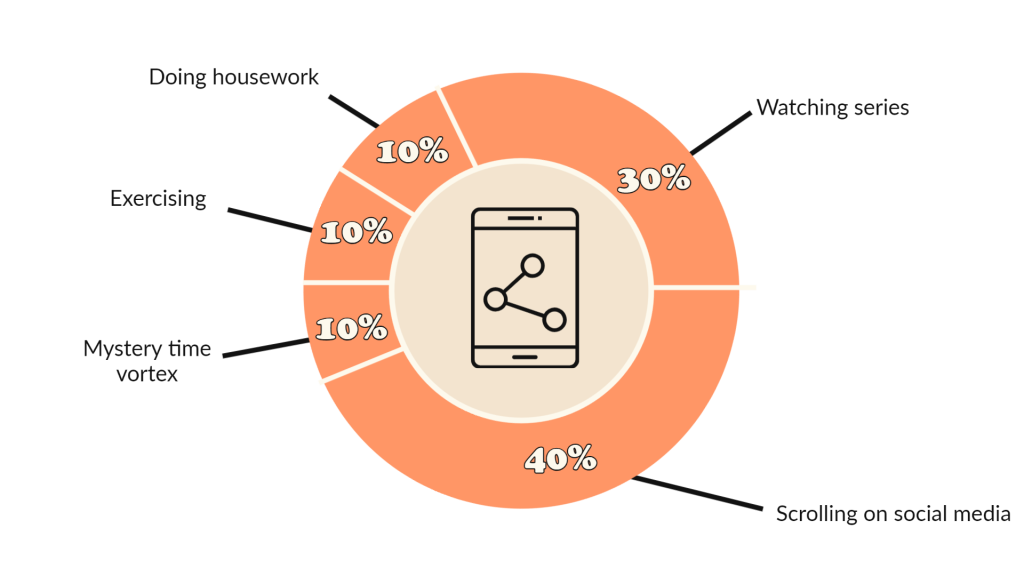Managing your time at uni
Time management skills don’t come naturally to everyone. In fact, many uni students really struggle with organising their schedules and keeping up to date with assessments, especially in the first few semesters of a course. Like anything else, with practice and some conscious effort you can improve your time management skills.

Read a blog post Bo wrote during the third year of their marketing degree about how they boosted their time management skills.
Catching the thief of time: How I improved my time management skills
I was talking to a classmate recently about our busy assessment schedule at this time of the year. She told me she wished that staying focused and managing her time came as naturally to her as it does to me. I laughed and corrected her – it’s taken a lot of conscious effort and habit-breaking strategies to get to the point where the end of each semester isn’t utter chaos.
I thought back to a project I’d had in first year. Our lecturer told us we’d need to work on it over the course of six weeks. I wasn’t worried. I told myself that I’d dedicate about five hours each week (starting the following week), and the bulk of it would be out of the way long before the due date.
It went more like this:

Whenever I sat down to work on the project, I’d find that I was distracted or unmotivated to work and would tell myself that I could just do it later, no big deal. Soon, week five arrived, and I’d barely started. To make matters worse, I quickly realised that I’d underestimated how long the project would take to complete. It was a stressful, chaotic week – I even had to give up a couple of shifts at work to finish the project in time. In the end, I wasn’t even satisfied with what I handed in.
I made a conscious decision that this wouldn’t happen again. Once the project was safely submitted, I spent an afternoon trying to work out where my time had gone. I factored in the hours I spent working at the restaurant, attending classes, and socialising, plus the small amount of time I had actually spent working on the project before week five.
My time looked something like this:
Most of my time was going to some mysterious ‘other’. But what had I been doing instead? After looking at my calendar, my screen-time breakdown, and the TV series I’d completed in the past month, I was able to estimate where my time had really gone.

Right. Now that I knew where my time was going when I wasn’t studying, I decided to use a study planner, rather than just telling myself ‘You will spend five hours a week on this’. I started intentionally overestimating how long it would take me to do a task so that I wouldn’t run out of time again. For some people, having a strict routine isn’t helpful, but I found that having specific chunks of time set aside for study worked for me. It didn’t solve all my time management problems, though. Even once I had the planner sorted out, I’d still procrastinate sometimes.
Procrastination is common, and although we have so many distractions these days, it isn’t a modern concept. Almost two thousand years ago, in his book of essays On the Shortness of Life, the Roman philosopher Seneca wrote:
“Putting things off is the biggest waste of life: it snatches away each day as it comes, and denies us the present by promising the future.”
So, I spent some time reading about the different reasons why people procrastinate, and I started to reflect on why I was doing it. Then I was able to use some strategies to help me change my habits, like learning how to set goals and studying with other people. Lots of unis organise group study sessions, and I found these really helpful. I study from home now, so I use my webcam and join online study sessions with people from all over the world!
DID YOU KNOW?
In early 2022, a popular ‘anti-procrastination café’ opened in Tokyo. Customers, generally writers and artists, must commit to a creative goal upon entry and the owner then holds them to their goal for the time they have said they’d like to work for.
Source:
McCurry J, (29 April 2021) ‘No excuses: testing Tokyo’s anti-procrastination cafe’, The Guardian
In second year, I got serious about setting goals to help me make the most of my study time. I’d started the year with some goals to study in the mornings, try to finish assessments earlier, and avoid procrastinating during study time. I was complaining to a friend about my lack of progress, and he pointed out how vague my goals were, and how easy it was for me to ignore them without clear steps.
“You know the whole idea of a ‘five-year plan’?” he said, “It’s not just thinking about what you want to have in five years’ time. It’s planning out the steps to get to that point. What you have right now are optimistic dreams, not goals. You need SMART goals!”
SMART is an acronym for goals which are specific, measurable, attainable, relevant, and time bound.

My friend had a point. I’ve always loved making lists and coming up with goals, but I never thought much about how I would achieve them. I decided to try writing my own SMART goals. Here’s an example:
Vague goal: I want to study more in the morning
SMART goal
Specific: I want to spend three hours working on assessments on Wednesday mornings
Measurable: I will set my alarm for 8am and study from 9am-12.05pm using the Pomodoro technique (this works out to be: six twenty-five-minute study blocks, each followed by a five-minute break. The fourth break can be fifteen minutes).
Attainable: I don’t have a late night on Tuesdays, and I don’t have classes until 2pm on Wednesdays, so I have enough free time to study for three hours and have a lunch break before class
Relevant: I organised my timetable so I would have this study time in the mornings this semester and I have not been taking advantage of it. Using this time would give me more free time on Thursday and Friday every week.
Time-bound: There are six more weeks in the semester. I will study for three hours each Wednesday morning until my assessments are complete for the semester.
I’ve been on this journey for two years now. Am I perfect at managing my time? Nope! Am I much better than I was as an overwhelmed first-year student navigating a whole new environment? Definitely.
Time management isn’t just a uni skill – it’s a life skill! We all work towards deadlines at some point, whether it’s at uni, at work, or in daily life – but we can learn how to manage them in ways that work for us. Focusing on improving these skills has made my life much easier. At the start of this post, I mentioned my stressed classmate. After I’d spilled my secret (that time management isn’t a natural talent) she decided to follow some of my steps and start better organising her time.
Are you struggling to meet deadlines too? Maybe it’s time you wrote some SMART goals or tried some anti-procrastination techniques. Good luck!

Being able to plan and manage your time allows you to minimise stress, complete high-quality work, and maximise your free time. What’s more, it’s a highly valued skill in the workplace. Employers want people who can meet deadlines and who are aware of the ways in which they work most productively. Whatever future course or career you are interested in, time management skills will help you succeed.
Learn more on Learning Lab
- Planners and schedules can help you organise your time. Have a look at the Time management tools page to get some ideas. (3 minutes)
- The Goal setting and focus tutorial is full of useful tips and includes an activity that will help you set your own SMART goals. (10 minutes)
- What is procrastination? Why do people do it? What can we do about it? The Procrastination page offers some answers to these questions and suggests strategies like the Pomodoro technique mentioned in Bo’s blog post. (7 minutes)

